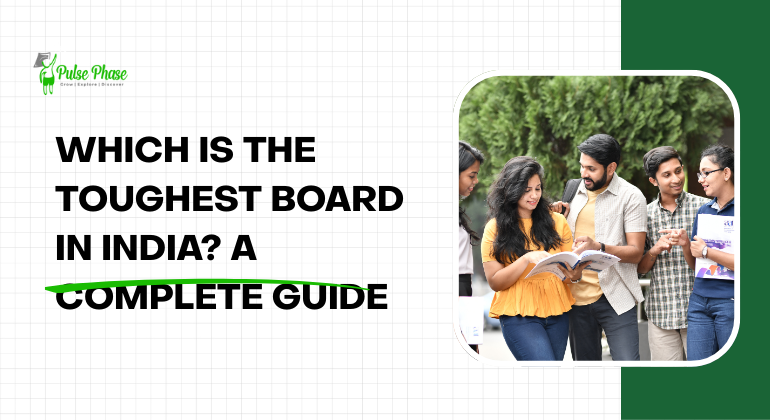In India, several academic boards coexist in the education system, where each board is responsible for developing its own school curriculum and examination system. The other boards which operate in India include the CBSE Board, the ICSE Board, the State Boards, the IGCSE Board, and the IB Board. This article is to evaluate the Toughest Board in India.
There is a never-ending debate among the three major stakeholders of the system: parents, students, and teachers. The comment redirects to a very common question, which is, “Which board in India is the most difficult?” This question is very difficult to state as a single answer, as many other factors, such as load and average skill required for a typical national exam question, may be involved.
This guide contains the details of the major boards in India, compares them against different benchmarks, and also answers the common questions: Which is the Toughest Board in India?
1. What Makes a Board “Tough”?
Before comparing boards, it’s important to understand the factors that can make one more challenging than another:
- Syllabus Depth: Courses with an expansive or detailed scope are often considered tougher.
- Assessment Style: Some boards tap into critical thinking and application-based education, whereas for other boards, it is more of a memory activity from the textbooks.
- Mastering multiple languages: An exam taken in high-proficiency languages, such as English, Swedish, or any regional language, is overwhelming for some students, who may not have the necessary skills.
- Subject coverage: The number of subjects, as well as the amount of project work performed, can increase the assignment load.
- Preparation for higher education: The requirements of the board in terms of preparation for competitive exams and studying aims may require a more business-like approach for certain students who are heading for foreign universities.
2. Overview of India’s Major Education Boards
A. CBSE (Central Board of Secondary Education)
CBSE is known to be one of the most popular academic boards in India, based on the fact that it adopts the use of NCERT books and its curriculum is targeted towards the formulation of logical reasoning needed for exams.
- Strengths: Its syllabus is structured in a way that it correlates well with JEE, NEET, and the other target exams.
- Approach: To compare the number of subjects required in other boards, the language being used is much simpler.
- Difficulty: The cut-through competition, at this level, seems moderate for most of the students to cope with, which makes this somewhat easy to understand the content without feeling stressed from academics.
B. CISCE (ICSE and ISC)
The CISCE conducts the Indian Certificate of Secondary Education (ICSE) for Class 10 and the Indian School Certificate (ISC) for Class 12.
- Strengths: Detailed curriculum across all subjects, including science, humanities, and languages.
- Unique Feature: High standards of English grammar, literature, and writing skills.
- Difficulty Level: High: The syllabus is vast and requires strong time management and comprehension skills.
C. IB (International Baccalaureate)
The IB curriculum is globally recognized for its academic rigor and emphasis on independent learning.
- Designation: Generally categorized into the Primary Years Programme, Middle Years Programme, and Diploma Programme
- Method: Research-based, project-based, and well-suited for inculcating critical thinking and analysis.
- Difficulty Level: Very High; Suitable for overseas higher education aspirants who wish to accomplish an internationally recognized qualification.
D. CAIE (Cambridge Assessment International Education)
CAIE is distinguished for offering qualifications such as IGCSE and A-Level and boasts a variety of subjects.
- Strengths: Encourages the study of various subjects through independence and application-based learning.
- Recognition: Desired by universities far and wide.
- Difficulty Level: Very High: demands self-discipline and advanced analytical abilities.
E. State Boards
The difficulty of India’s state assessment boards, such as the ones in Maharashtra Board, Tamil Nadu Board, Kerala Board, and West Bengal Board, differs a lot.
- Local language inclusion and preparation for state-level competitive exams are the strengths of India’s state assessment systems.
- Some of India’s state assessment boards don’t necessarily do very well in science and mathematics syllabi; for instance, the ones belonging to West Bengal and Kerala.
- Difficulty Level: Sometimes easy when going over certain materials, otherwise can be significantly hard.
3. Comparative Difficulty to get the Toughest Board in India
| Board | Syllabus Load | Evaluation Style | Global Acceptance | Indian Competitive Exam Suitability | Overall Difficulty |
| CBSE | Moderate | A mix of subjective and objective | Medium | High | Moderate |
| CISCE (ICSE/ISC) | High | Detailed subjective writing | Medium | Moderate | High |
| IB | Very High | Coursework, projects, essays | Very High | Low | Very High |
| CAIE | Very High | Application-based, research-heavy | Very High | Low | Very High |
| State Boards | Varies | Mostly textbook-based | Low | High (state exams) | Moderate-High |
4. Which Board Is Considered the Toughest?
A perspective-taking academic global standards view suggests that the International Baccalaureate (IB) tends to be more difficult than most of the Indian Boards of Education. The international nature of its curriculum, its practical assessment model, the worldviews embedded in its extended essays, and the Theory of Knowledge component are areas that particularly require students to use critical thinking and work independently.
Comparing the Indian national boards, many feel that the ICSE/ISC under CISCE is far more autonomous than CBSE due to its extensive subject coverage, stronger English requirements, and longer examination styles. On the other hand, the difficulty of the CBSE International or Cambridge International Exams (CAIE) is debatable.
In truth, a term often remains open to interpretation. Students who prepare for competitive examinations in India might consider CBSE to be a reasonable and more efficient option. Students who aspire to attend universities abroad might find IB or CAIE to be the most appropriate, but at the same time, the most frightening choice of them all.
5. Choosing the Right Board
In place of selecting a board solely based on its complexity, it’s more appropriate to connect your selection to the future:
- For entrance requirements in India for engineers/medics, CBSE is advantageous in the core discipline.
- For overseas education, IB or CAIE is more internationally acknowledged.
- For a blend of academics and co-curriculum, go with ICSE.
- For state and local job areas, state boards are the most relevant.
6. How to Succeed in Any Board
Should the board you are under change, it doesn’t complicate anything because these tips are still relevant:
- Begin at the end of the beginning of the year: This is beneficial, as it allows you to understand the syllabus from the start of the year
- Errands throughout the year: Formulate a realistic schedule and abide by it
- Consult the official course materials, Such as the textbooks and authentic study materials
- Go through past questions and papers: This assists you with preparing adequately on how the exam should be done
- Language Proficiency: Essential for boards that demand precise answers
- Juggle: Do not repeat your previous mistakes. Manage both academic and mental health stress.
READ ABOUT:
Conclusion
On a global scale, the IB is undoubtedly the Toughest Board in India, while ICSE is often perceived as the most difficult of the Indian boards. However, compared to the polarizing IB and ICSE, CBSE is easier to score, and that is why it is by far the international board IITians aim for.
Ultimately, the best decision varies with what it is you want to accomplish in your academic career, how you want to shape your life plans, and what type of learner you are. Difficulty should not be the sole deciding factor—it is more situational.
Read About :

